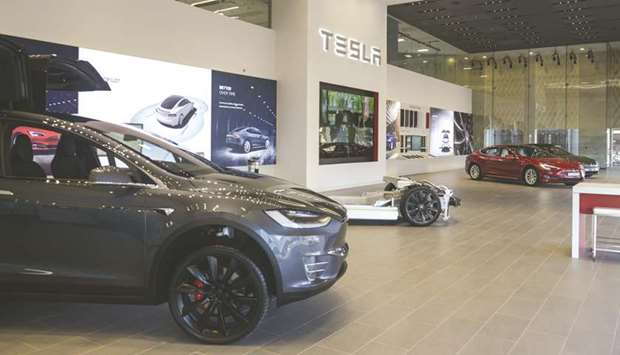Dubai has ambitious goals for electric cars. Early adopters get free parking, no tolls and discounts on registration fees. Even the power is gratis at the 200 charging stations the government installed throughout the city.
The trouble is the public is just fine without them.
The biggest buyer of electric vehicles is the government itself, dealers say, with hundreds sold in bulk to local authorities over the past few years. The few others spotted speeding up Dubai’s highways tend to be Teslas, which start at 335,730 dirhams ($91,400). Expats will splash out in this relatively low-tax city, but they often go for flashy sports cars.
The economic benefits of ownership aren’t strong in the UAE, which has some of the most affordable gas prices in the world and some of the hottest weather. It costs about $41 to fill a 16-gallon tank of gasoline in Dubai, compared with about $50 in the US or $125 in Norway, where plug-in hybrid and electric vehicles have boomed faster than anywhere else. Air conditioning — essential when the temperatures are regularly above 110 degrees in the summer — will drain an EV battery, decreasing the range.
“Unless you get someone who’s really into looking after the environment, to get the consumers into those vehicles, there’s not a lot of incentive,” said Bill Carter of Autodata Middle East, which provides data and valuation in the local industry.
Defensive driving is essential on Sheikh Zayed Road, the highway that runs parallel to the coast of the UAE.
Daily commutes in Dubai commonly involve a highway that stretches to 16 lanes in some areas. “The highways in Dubai and the UAE can be a little bit intimidating, so people here opt for bigger cars,” said Karim El-Jisr, executive director of the Dubai-based SEE Nexus Institute, which advises cities on sustainable development. “If we want to accelerate the uptake, we need a wider range of electric vehicles to satisfy tastes and wallets.”
Alf Ellefsen, a consultant in Dubai who drives a Jaguar, talks to his sister in Norway about her electric car. “It costs them close to nothing to run,” he said. “Here, you can buy a huge car for half the price that you can in Norway, and running it is like a [quarter] of the price. So why would you pay extra for an electric car?”
Still, the government estimates it could accommodate 32,000 electric vehicles on the road by 2020, if only car companies would offer suitable models for sale in the emirate of 3mn people. “Even today, if we give every incentive you can think of, there aren’t cars available,” said Faisal Rashid, a director at the Dubai Supreme Council of Energy. He says they regularly raise the supply issue with local car dealers.
There are about 4,000 hybrid and electric vehicles on the road now in Dubai, including fewer than 1,000 fully electric vehicles, he said. There’s a “soft” target of 10% of all vehicles in Dubai to be electric by 2030, he said.
When Renault started selling its electric Zoe three years ago, its first customer was the Dubai Electricity and Water Authority, followed by the Dubai Police and other utility and government agencies. “On the retail side, we haven’t seen the same success,” said Salah Yamout, director of sales and marketing at Arabian Automobiles Co, which sells the Renault brand here.
Tesla declined to provide sales figures for the region. But the company is taking reservations for the lower-priced Model 3 sedan and expects to deliver next year. The Road Transport Authority, which oversees the roads, public transportation and taxis, has said it will buy 200 Teslas to integrate into its fleet of 5,000 vehicles.
Tesla drivers don’t have to fight for spots at the charging station inside the Sustainable City in Dubai.
Some of the first electric-car chargers were installed in 2015 at Dubai Sustainable City, a 5mn-square-foot development designed to showcase the best practices for a modern, eco-friendly city. Among the town’s 2,700 residents, El-Jisr said, there are about 15 Teslas and no other electric vehicles.
Two of those Teslas belong to Fiona Brenninkmeijer, who ordered them right when Tesla opened its service centre and showroom in the region in July 2017. “I think they didn’t believe their luck,” she said of the salesmen.

Electric cars sit on display at the Tesla showroom in Dubai. The economic benefits of electric cars ownership aren’t strong in the UAE, which has some of the cheapest gas prices in the world and some of the hottest weather.
